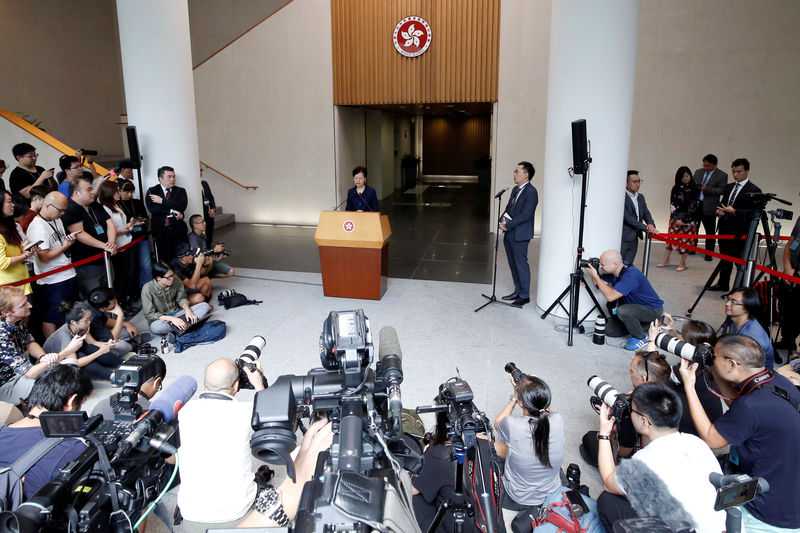H.K. leader sees ‘way out’ of chaos through dialogue
21 August, 2019

Hong Kong leader Carrie Lam said on Tuesday she hoped a peaceful weekend anti-government protest was the start of an effort to restore peace and that dialogue with peaceful protesters would provide a “way out” for the Chinese-ruled city.
Hundreds of thousands of protesters rallied peacefully in torrential rain on Sunday in the 11th week of what have been often violent demonstrations.
“I sincerely hope that this was the beginning of society returning to peace and staying away from violence,” Lam said.
“We will immediately start the work to establish a platform for dialogue. This dialogue, I hope, will be based on a mutual understanding and respect and find a way out for today’s Hong Kong.”
Anger erupted in June over a now-suspended bill that would allow criminal suspects in the former British colony to be extradited to mainland China.
But the unrest has been fueled by broader worries about the erosion of freedoms guaranteed under the “one country, two systems” formula put in place after Hong Kong’s return to China in 1997, including an independent judiciary and the right to protest.
Further protests are planned in the next few days, including one by MTR subway workers on Wednesday, secondary school students on Thursday and accountants on Friday.
The chaos has spread overseas. Twitter Inc. and Facebook Inc. said on Monday they had dismantled a social media campaign originating in mainland China that sought to undermine protests in Hong Kong.
Sunday’s turnout, which organizers put at 1.7 million, showed that the movement still has widespread support despite chaotic scenes last week when protesters occupied the airport.
Some activists had apologized for the airport turmoil and protesters could be seen on Sunday night urging others to go home peacefully.
Aside from Lam’s resignation, demonstrators have five demands — complete withdrawal of the extradition bill, a halt to descriptions of the protests as “rioting,” a waiver of charges against those arrested, an independent inquiry and resumption of political reform.
“The second question I have repeatedly replied on various locations and I can give you this very clear commitment at the political level is that the bill is dead,” Lam said. “There is no plan to revive the bill, especially in light of the public concerns.”
Police have been criticized for using increasingly aggressive tactics to break up demonstrations but there was a minimal police presence on Sunday and no arrests were made.
More than 700 people have been arrested since June.
Lam said the police watchdog had set up a task force to investigate complaints.
The protests have hit the economy of Hong Kong, one of the world’s busiest ports, with the Asian financial hub on the verge of its first recession in a decade.
Lam said she hoped Hong Kong had “unique advantages in attracting overseas companies,” stressing the rule of law, but warned of the risk of pressure on the economy which shrank 0.4 percent in April-June from the previous quarter.
“The Hong Kong economy is facing the risk of downturn. We can see this from the data in the first half. Actually, I think the data in the first half has not fully reflected the seriousness of the problem,” she said.
Secretary for Financial Services and the Treasury James Lau said on RTHK Radio that the likelihood of recession was “quite considerable.”
China has put strong pressure on big companies in Hong Kong over the protests, especially Cathay Pacific Airways. CEO Rupert Hogg quit in a shock move last week after Beijing targeted the airline over staff involvement in the protests.
Hogg’s sudden departure was announced by Chinese state television on Friday and was seen as a signal to other multinationals, such as HSBC Holdings and Jardine Matheson Holdings, to support Beijing.
Cathay also fired two pilots for taking part in protests.
China’s State Council on Monday called for greater development of the southern city of Shenzhen and integration of its culture and economy with neighboring Hong Kong and Macao, a former Portuguese-run enclave that returned to China in 1999.
Source:
TAG(s):
